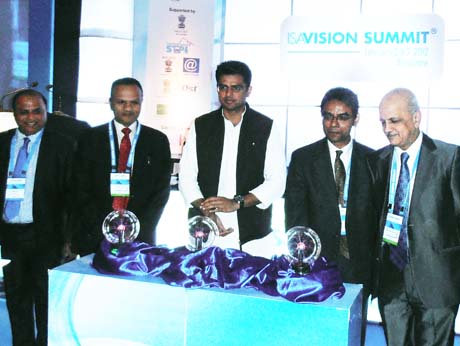
Bangalore, February 6, 2012 – India’s central cabinet has cleared a scheme to provide preferential market access to international players in the electronics manufacturing industry, who add at least 30 percent value to their products inside the country. The National Optical Fibre Network -- a country wide network touching every village -- and the National Knowledge Network – a scheme to link over 25,000 educational network – are likely to be the first candidates open for such international hardware participation, said R Chandrasekhar, Secretary, Department of IT and Department of Telecom, of the Indian government. He was speaking at the inaugural session of the India Semiconductor Association’s annual Vision Summit in Bangalore, February 6.
Other government guests at the opening session, added to the sum total of announcements, tailored to assure the gathered heads of the India-based semiconductor and electronic manufacturing industry that a hardnosed push to retake lost ground in hardware was imminent:
Minister of State for Communications and IT, Sachin Pilot, promised that all the ground work to set up India’s first ‘fab’ -- or silicon foundry – would be in place by year end. And to those who might have recalled hearing this particular promise almost five years ago, he added: “We are now more flexible; we are ready to walk more than half way with industry on this road… We will not just meet, but beat deadlines this time”.
Omkar Rai, Director General, Software Technology Parks India, said government would set up four VLSI incubators -- the first to come up in Bangalore, India’s Silicon City.
Most official speakers echoed the hope and the challenge articulated by the lead speaker -- Pradeep N Dhoot, President of Videocon India Ltd, a leader in the diversified electronics business best known for its indigenous brand of TV set: that the target of $ 400 of turnover in indigenous electronics manufacturing ( against less than $ 100 today) would be handsomely surpassed. A turnover of a trillion dollars was doable, Dhoot said. To achieve this, we need at least 50 fabless design houses in the country, he said, throwing a hint that Videocon was poised to announce its own fab plans.
In his remarks at the evening session, Indian Minister for HRD, Communications & IT, Kapil Sibal, returned to his pet theme – the ‘made in India’, $35 Aakash Tablet and promised that every student in India, would get one for free – eventually. The government would subsidise half the cost of manufacture and the educational institutions would be expected to match this, he suggested.
ISA Vision Summit 2012, the seventh edition of the flagship annual conference of India Semiconductor Association has as its them this year: “Growth drivers for emerging markets: Semiconductors and Electronic Systems.” This is the the largest Vision Summit, since its inception in 2006. ISA has added 41 new members since last year which includes greater presence of Indian companies. Out of the total of 175 members two-thirds are the semiconductor companies and remaining are the system companies. www.isaonline.org